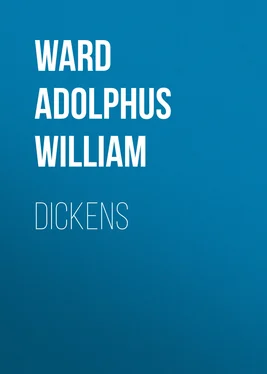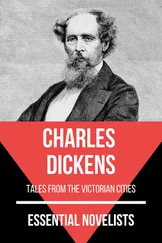Adolphus Ward - Dickens
Здесь есть возможность читать онлайн «Adolphus Ward - Dickens» — ознакомительный отрывок электронной книги совершенно бесплатно, а после прочтения отрывка купить полную версию. В некоторых случаях можно слушать аудио, скачать через торрент в формате fb2 и присутствует краткое содержание. Жанр: Биографии и Мемуары, foreign_antique, на английском языке. Описание произведения, (предисловие) а так же отзывы посетителей доступны на портале библиотеки ЛибКат.
- Название:Dickens
- Автор:
- Жанр:
- Год:неизвестен
- ISBN:нет данных
- Рейтинг книги:5 / 5. Голосов: 1
-
Избранное:Добавить в избранное
- Отзывы:
-
Ваша оценка:
- 100
- 1
- 2
- 3
- 4
- 5
Dickens: краткое содержание, описание и аннотация
Предлагаем к чтению аннотацию, описание, краткое содержание или предисловие (зависит от того, что написал сам автор книги «Dickens»). Если вы не нашли необходимую информацию о книге — напишите в комментариях, мы постараемся отыскать её.
Dickens — читать онлайн ознакомительный отрывок
Ниже представлен текст книги, разбитый по страницам. Система сохранения места последней прочитанной страницы, позволяет с удобством читать онлайн бесплатно книгу «Dickens», без необходимости каждый раз заново искать на чём Вы остановились. Поставьте закладку, и сможете в любой момент перейти на страницу, на которой закончили чтение.
Интервал:
Закладка:
Goldsmith himself could not have put more of pathos and more of irony into a single word.
But it may seem out of place to dwell upon details such as this in view of the broad and universally acknowledged comic effects of this masterpiece of English humour. Its many genuinely comic characters are as broadly marked as the heroes of the least refined of sporting novels, and as true to nature as the most elaborate products of Addison’s art. The author’s humour is certainly not one which eschews simple in favour of subtle means, or which is averse from occasional desipience in the form of the wildest farce. Mrs. Leo Hunter’s garden-party—or rather “public breakfast”—at The Den, Eatanswill; Mr. Pickwick’s nocturnal descent, through three gooseberry-bushes and a rose-tree, upon the virgin soil of Miss Tomkins’s establishment for young ladies; the supplice d’un homme of Mr. Pott; Mr. Weller junior’s love-letter, with notes and comments by Mr. Weller senior, and Mr. Weller senior’s own letter of affliction written by somebody else; the footmen’s “swarry” at Bath, and Mr. Bob Sawyer’s bachelors’ party in the Borough—all these and many other scenes and passages have in them that jovial element of exaggeration which nobody mistakes and nobody resents. Whose duty is it to check the volubility of Mr. Alfred Jingle, or to weigh the heaviness, quot libras , of the Fat Boy? Every one is conscious of the fact that in the contagious high spirits of the author lies one of the chief charms of the book. Not, however, that the effect produced is obtained without the assistance of a very vigilant art. Nowhere is this more apparent than in the character which is upon the whole the most brilliant of the many brilliant additions which the author made to his original group of personages. If there is nothing so humorous in the book as Sam Weller, neither is there in it anything more pathetic than the relation between him and his master. As for Sam Weller’s style of speech, scant justice was done to it by Mr. Pickwick when he observed to Job Trotter, “My man is in the right, although his mode of expressing his opinion is somewhat homely, and occasionally incomprehensible.” The fashion of Sam’s gnomic philosophy is at least as old as Theocritus; 1 1 See Idyll . xv. 77. This discovery is not my own, but that of the late Dr. Donaldson, who used to translate the passage accordingly with great gusto.
but the special impress which he has given to it is his own, rudely foreshadowed, perhaps, in some of the apophthegms of his father. Incidental Sam Wellerisms in Oliver Twist and Nicholas Nickleby show how enduring a hold the whimsical fancy had taken of its creator. For the rest, the freshness of the book continues the same to the end; and farcical as are some of the closing scenes—those, for instance, in which a chorus of coachmen attends the movements of the elder Mr. Weller—there is even here no straining after effect. An exception might perhaps be found in the catastrophe of the Shepherd, which is coarsely contrived; but the fun of the character is in itself neither illegitimate nor unwholesome. It will be observed below that it is the constant harping on the same string, the repeated picturing of professional preachers of religion as gross and greasy scoundrels, which in the end becomes offensive in Dickens.
On the whole, no hero has ever more appropriately bidden farewell to his labours than Mr. Pickwick in the words which he uttered at the table of the ever-hospitable Mr. Wardle at the Adelphi.
“‘I shall never regret,’ said Mr. Pickwick, in a low voice—‘I shall never regret having devoted the greater part of two years to mixing with different varieties and shades of human character; frivolous as my pursuit of novelty may appear to many. Nearly the whole of my previous life having been devoted to business and the pursuit of wealth, numerous scenes of which I had no previous conception have dawned upon me—I hope to the enlargement of my mind, and to the improvement of my understanding. If I have done but little good, I trust I have done less harm, and that none of my adventures will be other than a source of amusing and pleasant recollection to me in the decline of life. God bless you all.’”
Of course Mr. Pickwick “filled and drained a bumper” to the sentiment. Indeed, it “snoweth” in this book “of meat and drink.” Wine, ale, and brandy abound there, and viands to which ample justice is invariably done—even under Mr. Tupman’s heart-rending circumstances at the (now, alas! degenerate) Leather Bottle. Something of this is due to the times in which the work was composed, and to the class of readers for which we may suppose it in the first instance to have been intended; but Dickens, though a temperate man, loved the paraphernalia of good cheer, besides cherishing the associations which are inseparable from it. At the same time, there is a little too much of it in the Pickwick Papers , however well its presence may consort with the geniality which pervades them. It is difficult to turn any page of the book without chancing on one of those supremely felicitous phrases in the ready mintage of which Dickens at all times excelled. But its chief attraction lies in the spirit of the whole—that spirit of true humour which calls forth at once merriment, good-will, and charity.
In the year 1836, which the commencement of the Pickwick Papers has made memorable in the history of English literature, Dickens was already in the full tide of authorship. In February, 1837, the second number of Bentley’s Miscellany , a new monthly magazine which he had undertaken to edit, contained the opening chapters of his story of Oliver Twist . Shortly before this, in September and December, 1836, he had essayed two of the least ambitious branches of dramatic authorship. The acting of Harley, an admirable dry comedian, gave some vitality to The Strange Gentleman , a “comic burletta,” or farce, in two acts, founded upon the tale in the Sketches called The Great Winglebury Duel . It ran for seventy nights at Drury Lane, and, in its author’s opinion, was “the best thing Harley did.” But the adaptation has no special feature distinguishing it from the original, unless it be the effective bustle of the opening. The Village Coquettes , an operetta represented at the St. James’s Theatre, with music by Hullah, was an equally unpretending effort. In this piece Harley took one part, that of “a very small farmer with a very large circle of intimate friends,” and John Parry made his début on the London stage in another. To quote any of the songs in this operetta would be very unfair to Dickens. 2 2 For operas, as a form of dramatic entertainment, Dickens seems afterwards to have entertained a strong contempt, such as, indeed, it is difficult for any man with a sense of humour wholly to avoid.
He was not at all depressed by the unfavourable criticisms which were passed upon his libretto, and against which he had to set the round declaration of Braham, that there had been “no such music since the days of Shiel, and no such piece since The Duenna .” As time went on, however, he became anything but proud of his juvenile productions as a dramatist, and strongly objected to their revival. His third and last attempt of this kind, a farce called The Lamplighter , which he wrote for Covent Garden in 1838, was never acted, having been withdrawn by Macready’s wish; and in 1841 Dickens converted it into a story printed among the Picnic Papers , a collection generously edited by him for the benefit of the widow and children of a publisher towards whom he had little cause for personal gratitude. His friendship for Macready kept alive in him for some time the desire to write a comedy worthy of so distinguished an actor; and, according to his wont, he had even chosen beforehand for the piece a name which he was not to forget— No Thoroughfare . But the genius of the age, an influence which is often stronger than personal wishes or inclinations, diverted him from dramatic composition. He would have been equally unwilling to see mentioned among his literary works the Life of Grimaldi , which he merely edited, and which must be numbered among forgotten memorials of forgotten greatness.
Интервал:
Закладка:
Похожие книги на «Dickens»
Представляем Вашему вниманию похожие книги на «Dickens» списком для выбора. Мы отобрали схожую по названию и смыслу литературу в надежде предоставить читателям больше вариантов отыскать новые, интересные, ещё непрочитанные произведения.
Обсуждение, отзывы о книге «Dickens» и просто собственные мнения читателей. Оставьте ваши комментарии, напишите, что Вы думаете о произведении, его смысле или главных героях. Укажите что конкретно понравилось, а что нет, и почему Вы так считаете.












